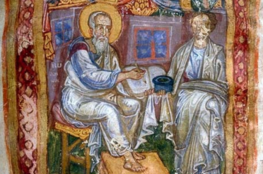Two fresh items on Catholicism and Eastern Orthodoxy recently caught my eye, so I thought I might call attention to them both.
The first, Fr. Mark Drew’s Catholic Herald article “What Catholics Can Learn From Orthodox Synods,” covers in detail a topic I dealt with in Crisis last year, namely synodality. Fr. Drew is less skeptical toward the synodal model than I, though my position on the matter has softened due to current events. Some disparage the Orthodox synodal model as too decentralized, limited in scope, and ineffective. However, in the light of ongoing Extraordinary Synod on the Family in Rome, there are no doubt more than a few Catholics praying for a muted outcome to the proceedings. Where I disagree with Fr. Drew is how much Orthodoxy—or, for that matter, Catholicism—really needs centralization, at least in its current Roman manifestation. It is far from clear that Pope Francis truly believes in synodality, and his role as the guardian of the Faith has come under scrutiny in light of numerous statements (some, admittedly, off-the-cuff) which seem freighted with doctrinal confusion. Moreover, given the vast number of bishops in the Roman Church who routinely fail to uphold the Church’s indefectible teachings, providing them with greater doctrinal authority would be highly imprudent at this juncture. Of course, the Orthodox have largely left doctrine alone for the past millennium, which has not been an entirely bad thing at all.
Second, my friend Elliot Milco has written a thoughtful reply to my recent tweet asking why Catholics choose not to convert to Eastern Orthodoxy. I should note that the point of my tweet was not to challenge Catholics on this, but rather to gain a better understanding of the matter. Not too long ago many Catholics I knew who had seriously contemplated Orthodoxy claimed that the absence of a central authority figure (the pope) and Orthodoxy’s approach to remarriage compelled them not to leave. Now, however, Pope Francis has cleared the way for what some are calling “Catholic divorce” with a process which appears to be less exacting than what certain Orthodox jurisdictions follow when granting marriage dissolutions. As for the papacy, it’s hardly breaking news to point out that many conservative and traditional Catholics are less than thrilled with Francis’s pontificate and the new style of Ultramontanism which accompanies it. Milco addresses these matters and more, and I thank him for taking the time to do so.




October 6, 2015
Well, I, for one, have been and am considering reverting to Orthodoxy, but for now, the better path seems to be to go slow, discern more, and in the meantime increase my contacts with the Greek Catholics. Eliot Milco may be comfortable resting in Saint Thomas, of course a giant deserving of the greatest respect, but I find reading the Fathers, both of the early Church kind and the more recent Orthodox kind, more attractive. One cannot avoid the fact that when one opens up a Latin Catholic website or FB today, there is an atmosphere of combat and tension, while reading the holy fathers and their modern disciples one becomes serene, and meditates on the important, eternal things.
October 7, 2015
I think an actual analysis of Orthodox history, fathers, etc. reveals the tradition to be far richer and more intellectually robust that Milco says. And, while Orthodoxy only recognizes 7 ecumenical councils officially, there have indeed been councils since then which have had churchwide authority.
The problem is that Orthodoxy, as it is often presented in modern apologetics, at least in English, tends to be a caricature of a caricature and I can understand why the impoverished and sloganeering product that results is not especially attractive to anyone with intellectual integrity.
October 7, 2015
I can do everyone one better and ask, “Given the problems of the Catholics, the Orthodox, AND the Protestants, why remain Christian at all?”
I promise I’m not posing this question just to be a gadfly. I ask it because some so-called Christians I know have demonstrated by their actions that Christ is not their priority. When I was in a Christian school, I could more or less tell among my classmates who was there because their parents didn’t want them to be in the bad influence of public school, so their later “apostasy” didn’t surprise me. What did, and what has shocked me was hard core, intellectual, can-quote-encyclicals-better-than-the-rest Catholics and Christians chiding their brothers for not being as worldly as they.
When I saw this, I nearly threw up my hands and yelled, “What was the point of all this struggle when I could spent the years reading doing all the cool shit I wasn’t allowed to do?”
October 7, 2015
“Which brings me to the real reason I’m not interested in converting to Orthodoxy: I have faith that the Roman Catholic Church is the true Church, established by Christ, which is indefectible, in which the fulness of faith resides, which is anchored visibly in the person of the Pope, who is a sign of continuity and who holds, in the place of Christ, the primacy of jurisdiction over the Church Militant.”
Amen. This has got to be the fundamental reason any Catholic stays Catholic.
October 8, 2015
Not mentioned, but for me a great stumbling block, is that Byzantine Orthodoxy cannot see the Church universal except through the very narrow cultural lens of Byzantium. It has limited the universality of the Church to a single cultural identity.
October 9, 2015
I guess you’ve never encountered Russian Orthodoxy, Syro-Arabic Orthodoxy, Georgian Orthodoxy, Romanian Orthodoxy, or Native Alaskan Orthodoxy? Yes, we are all inheritors of the Basileia Rhomaion, but that is not our only “lens.” Nor is it a narrow one—the ancient East was very diverse, and anyone who knows anything about the history of Orthodox thought or liturgics knows that they were guided as often if not more often by Antiochene, Palestinian, and Alexandrian influences as by, say, Cappadocian or Studian or Athonite. But perhaps all such things are indistinguishable from the outside (the way, say, the Roman Catholic Church “feels” predominantly Italian and French and Spanish to me).
October 13, 2015
Yes, and the clerical dress of Serbian, Russian, Greek and Romanian priests are all slightly different. My such catholicity. One can compare this Byzantine uniformity with the Apostolic traditions embraced by both Rome and the Oriental Orthodox.
Oh, by the way, the so-called Arabic Orthodox of which you speak is simply the very Greek rite in Arabic, and recently at that.
I have heard all of this palaver before, and still remained unconvinced. Please simply post the list of all non-Byzantine rite diocese within Byzantine Orthodoxy. Oops surprise, there aren’t any.
October 10, 2015
“Not mentioned, but for me a great stumbling block, is that Byzantine Orthodoxy cannot see the Church universal except through the very narrow cultural lens of Byzantium. It has limited the universality of the Church to a single cultural identity.”
It has done nothing of the kind. From the Orthodox standpoint, the western patriarchate fell into error and schism and its Protestant offshoots even more so. In other words, the portion of the Church indigenous to those cultures separated itself from the Church. This entailed the loss of continuous, organic Tradition in the West. What exactly are the Orthodox supposed to do when Tradition in the West has been broken? This is just the way things have played out, and certainly not Orthodoxy’s fault.
In terms of eschatology, thank God the Church from its earliest days meshed with individual cultures rather than impose uniformity on all. Nothing is more blatantly satanic and “antichristian” than the current drive toward one world government (which minimally the last three popes have openly called for in their encyclicals) where there can be no escape from the necessarily unrestrained, absolute imposition of fallen human will. We are told by the dark side, as justification, that the nation-state is obsolete. Well, obviously the Orthodox are custom fit to defend the much maligned nation-state against this blatant agenda of antichrist and, it is hoped, to never submit to same. Praise God!
I can think of no stronger argument for the truly believing Christian that Orthodoxy is indeed the One True Church, and unfortunately it is not heard nearly often enough. And by all means keep compounding those overlapping jurisdictions in the New World because all that means is that there is no HUMAN locus of power in the Church, which in turn means that it is that much more difficult, if not impossible, for the dark side to co-opt as they have plainly co-opted everything else at this point. As the faith obviously only endures in the absence of absolute human control so the gates of Hades shall never prevail against the Orthodox Church. Glory be to God!
October 13, 2015
“This entailed the loss of continuous, organic Tradition in the West. What exactly are the Orthodox supposed to do when Tradition in the West has been broken? This is just the way things have played out, and certainly not Orthodoxy’s fault”; the Byzantines consider the ancient eastern traditions to be “baggage” as well.
October 11, 2015
I agree. I have gone through Eastern Orthodoxy, spent time in Eastern Catholic parishes, but am a Western Catholic at heart. I’m not happy with the cult of personality that has developed around the Popes and struggle with papal infallibility and universal jurisdiction, but now go to a good Roman Catholic parish that offers the TLM every Sunday and holy days and has the most reverent Novus Ordo Masses I have been to. I just try not to think of what goes on in Rome. It is not worth it to me to give up my heritage and go to a communion that says where I am from is crap and basically not even Christian. I find it abhorrent that many Orthodox rebaptize already fully initiated Catholics and says everything before in a person’s life in Christ was for nothing.
October 13, 2015
So very well said Anthony.
October 19, 2015
[…] My position on the matter has, admittedly, softened over the past year (see, for example, here and here), though not to the point where I believe that Roman Catholicism (as opposed to the Eastern […]